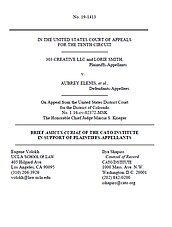Learn more about Cato’s Amicus Briefs Program.
For over a decade, Colorado law has prohibited businesses from discriminating against individuals on the basis of sexual orientation. Several small businesses in the state are owned and operated by individuals who believe that marriage should be between a man and a woman. Although these business owners are happy to serve customers of any sexual orientation, they have declined to offer their creative services to promote or celebrate same-sex weddings, because they feel that doing so would convey a message that conflicts with their deeply held beliefs.
Famously, the owner of one such small business refused to create a cake for a same-sex wedding in 2012, a controversy that ended up in the Supreme Court. Cato filed a brief in that case supporting the baker—the only organization to do so that also filed briefs supporting the plaintiffs in Obergefell and the other marriage cases—and his right to refrain from conveying messages with which he disagrees.
Unfortunately, the Supreme Court’s 2018 ruling in Masterpiece Cakeshop was exceedingly narrow and failed to clarify the crucial First Amendment issue: can a state compel an artistic professional to produce something conveying a message that he disagrees with? Lacking a definitive answer to this question, cases like the baker’s have surfaced repeatedly in Colorado and other states. (Cato filed a brief in in support of wedding videographers fighting a similar Minnesota law in the U.S. Court of Appeals for the Eighth Circuit, which ultimately held that the First Amendment stopped antidiscrimination laws from being used to compel speech in this way).
Cato has now filed a brief, joined by UCLA law professor Eugene Volokh, in support of another challenger to the Colorado law: web designer Lorie Smith, who creates websites and graphic designs for clients through her one-woman business. Lorie would like to create websites helping opposite-sex couples celebrate their weddings, but knows that Colorado will then force her to also create sites celebrating same-sex weddings, which she cannot do in good conscience. The Supreme Court has long held that the right to speak includes the right not to speak. Lorie brought this lawsuit to vindicate that right.
Just as the government can’t demand that a Cato scholar write an article supporting the government’s preferred policy, it can’t compel those in expressive professions like web and graphic design, photography, or musical performance to harness their artistic gifts in support of the state’s message. That the artists are offering their services commercially is no matter; how many rock bands play all their gigs for free?
Cato strongly advocated that, so long as states were involved in the marriage business, they should extend marital licenses to gay couples. But private businesses aren’t the government and the messages they express aren’t government messages. The First Amendment demands that private citizens and businesses be able to maintain their freedom of speech and conscience, and we urge the Tenth Circuit to join the Eighth in saying so.

This work is licensed under a Creative Commons Attribution-NonCommercial-ShareAlike 4.0 International License.



